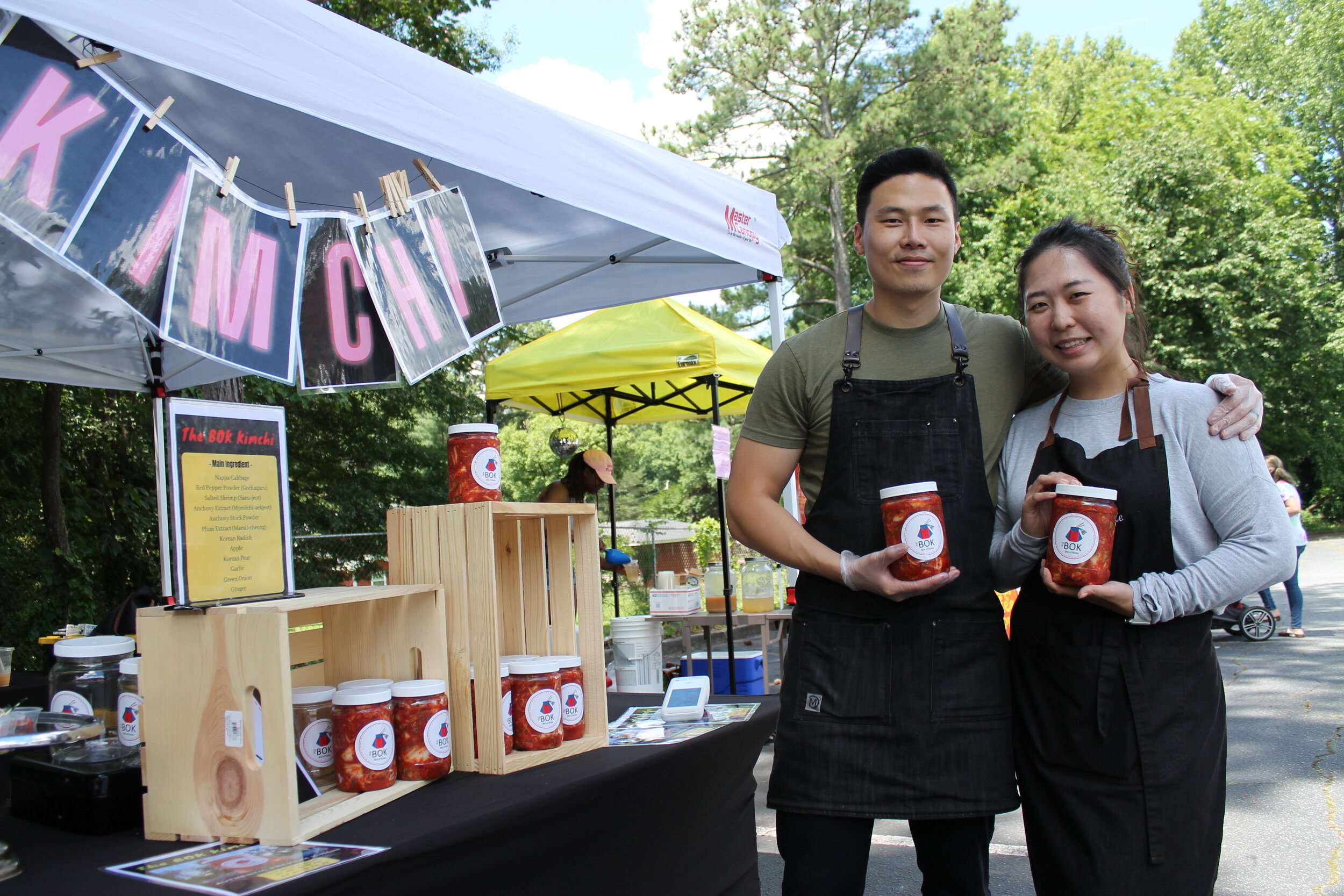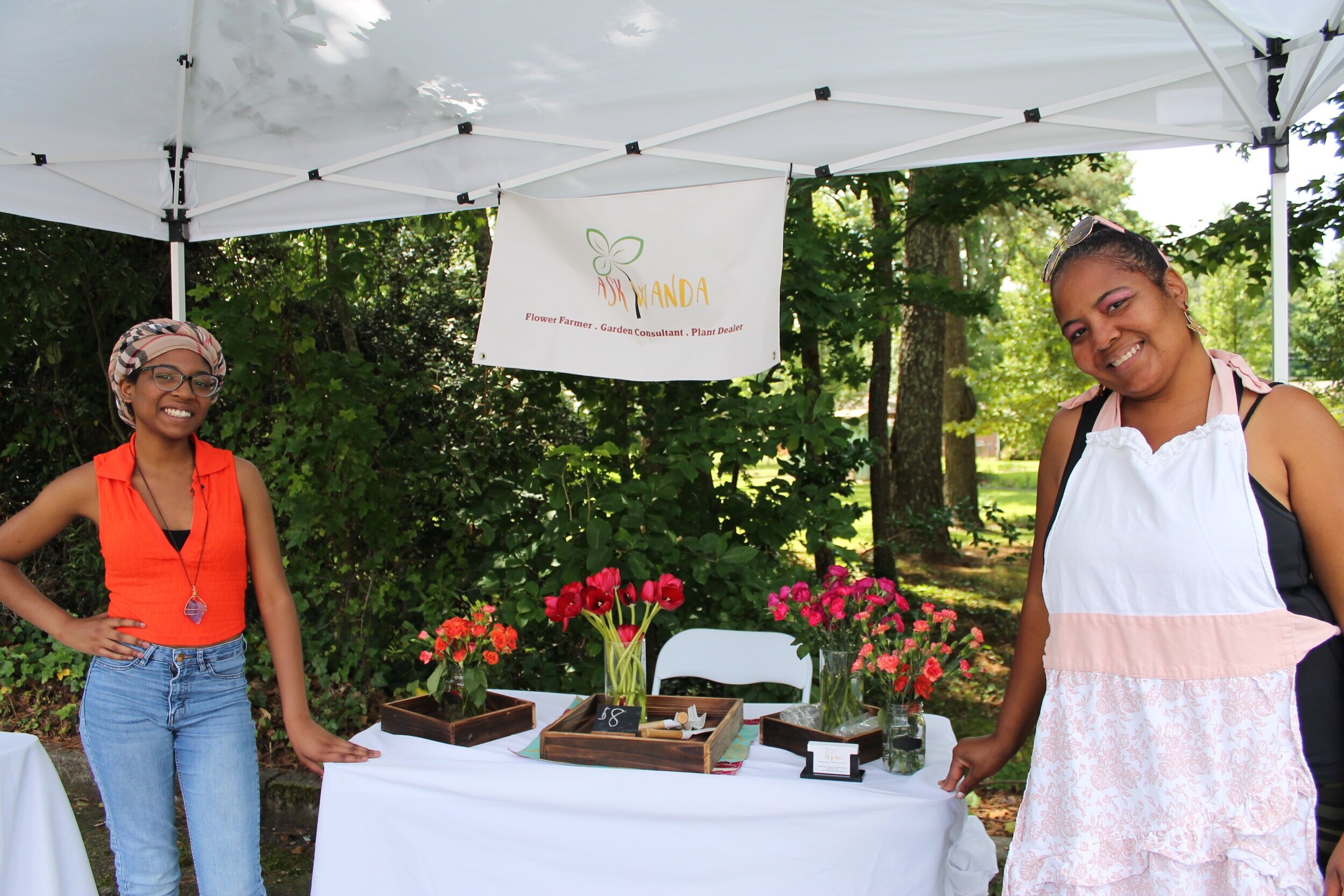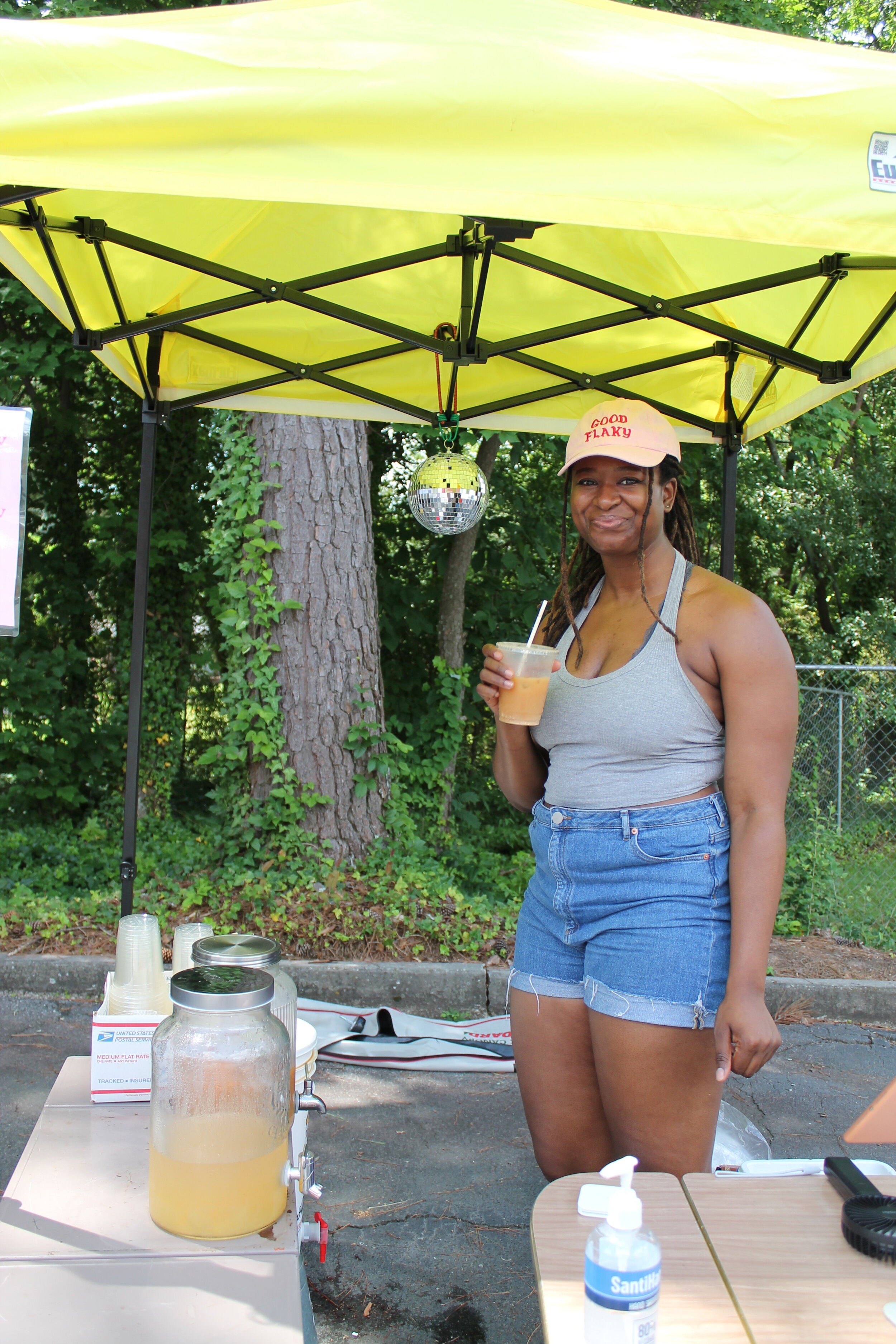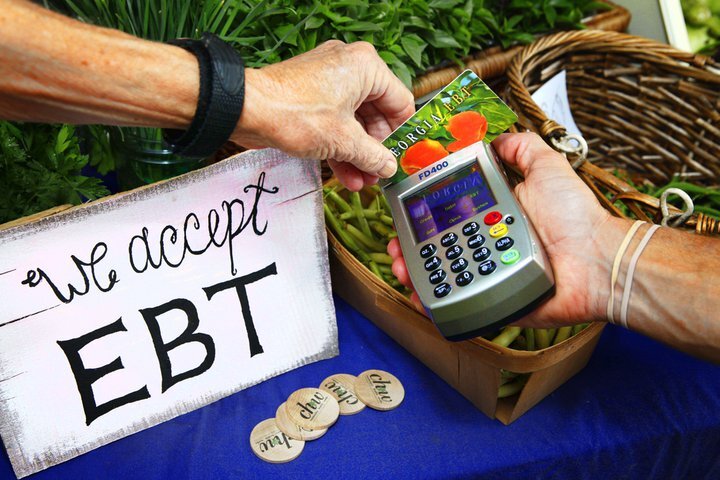By Suzanne Girdner
Georgia Organics’ Community Outreach Manager and lead of Georgia Food Oasis
Sun Market (eatfromthefarms.com) received a Georgia Food Oasis 2021 Planning Grant to help with launching and promoting its first market season in April 2021.
Led and managed by Gabbie Atsepoyi, a community activist living and working in Decatur, GA, Sun Market is on a mission to create affordable access to fresh local food for neighbors of communities near Columbia Drive, an area that lacks access to high quality fresh foods. Another critical start-up partner, Wholesome Wave Georgia allows Sun Market to double SNAP dollars to extend food budgets for working families.
I visited with Gabbie at Sun Market on a gloriously low-humidity morning on June 26 and met with a family of hard-working and generous vendors, who filled my arms with delicious food, and reminded me that community happens through the grace of a neighbor seeking and making space for connection with others.
1. Tell us about yourself and one of your favorite ways to celebrate with food? Or a favorite food memory?
Gabbie Atsepoyi, founder of Sun Market. Photo credit: Suzanne Girdner.
I’m Gabbie Atsepoyi (Aa-she-poo-yee), a first-generation Nigerian-American from Denver, Colorado. I moved to Atlanta in 2012 and now live in South DeKalb with my partner, Brent and 2-year old child. I graduated from Spelman College where I studied the environment, specifically policy, soil science and carbon cycling, so I love the earth and I’m committed to sharing with others the impacts of climate change on our world.
I also really love food and believe access to fresh produce is a basic human right. Food sovereignty within our communities deserves a special spotlight in conversations relating to equity, health and environmentalism. So I’m happy to share Sun Market’s purpose to our neighbors to jump start important conversations.
As a Nigerian-American, when in Nigeria, I grew up eating most meals served family-style. I have strong memories of the aromas and the associated story of each produce purchased from the market. Because my parents are immigrants so were many of their friends, and as a child each new family friend I met exposed me to new flavors, aromas and traditions. In this way I grew up eating to experience culture.
2. Why do foodways and fresh food access matter so much to you?
My great-grandfather in Nigeria gifted all of his sons, including my grandfather, land to care for and steward. My grandfather managed the land, and my grandmother sold their produce at the market. They were able to provide for their large family through farming for themselves and others. So this idea of caring for the land and feeding the next generation was very normal to me, and part of my family’s tradition. Later in college, I went to a seminar and the conversation focused on the soils of Africa--such a vague word for a vast continent with many countries!--and the presenting researcher went on to suggest corn species that would “help” people eat more nutritious foods. It was a complete shock to me — the Nigeria I knew was lush with fertile soil and had diverse and abundant crops that are more nutritionally dense and better for the environment than any species of corn could be (no shade to corn, and its complex food history).
3. Tell us about Sun Market?
Sun Market is a local farmers’ market that exist only because of the sun. Thanks to the sun and soil we are able to utilize produce for energy and nutrients. Our main objective is to share locally grown produce to our neighborhood. When I first moved to Atlanta, I was amazed by the offerings at the farmers markets. So much grows in Georgia! As I was starting to plan Sun Market initially, I was hoping to invite farmers out to vend, but as a new market that was harder than I anticipated--it’s really hard to be a new and unknown market and attract farm vendors! So I responded to this detour in my plan by buying produce wholesale from farmers, and then selling pre-packed produce bags filled with seasonal greens, herbs, root vegetables, and fruits — all sourced exclusively from nearby Black farmers. Luckily, the produce bags have proven beneficial at establishing a steady supply of produce, and helped us in setting a weekly budget and price point for shoppers. Our bags are filled with a week’s worth of produce, and separately shoppers can purchase mushrooms, eggs, and honey. Our produce bags cost between $35 or $40 per bag. We accept and double SNAP/EBT which means we can offer these bags to SNAP households between $17 or $20. So far the farmers have been open to the arrangement because they save time and are able to avoid traveling to another market, and we pay them on time. It’s a mutually beneficial relationship that I hope will grow. We want to pay Black farmers and share produce grown by them to our historically Black community while also addressing food insecurity and fresh food access.
4. It feels like there’s a real sense of intention at Sun Market, from the produce sourcing to the rotation of market vendors each week, so there’s always something different but a real sense of global community. Tell us about the experience(s) you’re facilitating between vendors and community in this way?
We are intentional about our mission - the rest has been divine alignment. Columbia Drive United Methodist Church was one of our first supporters and every week they allow us to show up, use the refrigerators, store our equipment and occupy their parking lot. They also provide a warm welcome to the Sun Market community. Each week, a new vendor or reoccurring vendor shows up to share a product they grew, a food they specialize in, or a group of foods unique to their culture and life experiences. We like to say that “Our vendors reflect the diversity of this country” because it’s true! We are so grateful for the pop-up food scene of chefs that support our mission each market. In the rain or on a hot Georgia day we fall in love each week with our neighbors (near and far) who come to our market for food and produce. After 2020 this type of gathering feels so fulfilling - here we all are - gathering together (outside), eating food from around the world, surrounded by fresh local produce and we are laughing and enjoying flavors — together. Sun Market cultivates diversity in age, ethnicity, culture, economic background and in experiences and we’ve been able to do this by aligning on a mission that uplifts and supports the community we serve and live in.
5. What are the biggest challenges you’re facing right now in your first season as a market?
Whew. Time. I work in paid media and I have a toddler and a family. But thanks to the help of my partner and our friends and family we get things done.
Our second biggest challenge is locating new Black farmers that are ready to sell through our market. In my “Request for Support” letter than I share with farmers, I suggest partnering with Sun Market and the Candler Black Market, led by Neelah Hinds. I hope by offering two back-to-back markets to vend at, we can create an opportunity for our community to purchase fresh produce during the weekends.
Because I’ve had conversations with farmers and I’m aware of the lack of monetary and foundational support Black farmers receive in Georgia and nationally. I approach every new conversation to vend with grace and understanding. I’m new to the Atlanta agriculture space and there’s a lot for me to learn. I’m hopeful that in each year we will grow our partnerships with Black farmers, supporting organizations and community members who support our mission.
6. What are some positive lessons you’ve learned 3 months into managing a market?
1. Word of mouth is everything!
2. People are happy to support and show-up.
3. Food is really the meeting point for community.
4. Leafy greens are so sensitive!
7. What’s your hope for Sun Market over the next 1-2 years?
In two years, I hope to be working towards a brick and mortar location for Sun Market with standard hours. That operates as a farmers led co-op with sliding membership fees that’s located in a food desert like the one we are currently located in South DeKalb County.
8. What are the best ways for folks to get engaged as shoppers, potential vendors, or sponsors?
· Every Saturday (April-Sept): 11am-2pm at 2067 Columbia Drive, Decatur 30032
· Website: eatfromthefarms.com/
· Instagram: nstagram.com/eatfromthefarms/
· Accepts & Doubles: SNAP/EBT


























